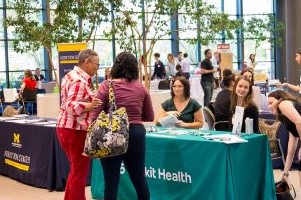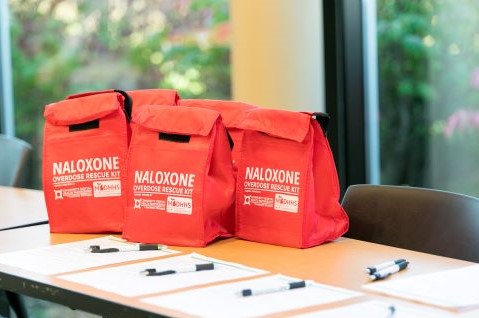 Story by Matthew Hill, Washtenaw Health Initiative Substance Use Disorder Program Manager
Story by Matthew Hill, Washtenaw Health Initiative Substance Use Disorder Program Manager
Roughly 250 people, representing many different professional and community organizations, participated in the second county-wide opioid summit held on October 1st, organized by the Washtenaw Health Initiative Opioid Project. The Opioid Project’s co-chairs, Nicole Adelman and Jimena Loveluck opened the event by focusing on the stigma surrounding substance use disorders and how its negative effects still present barriers despite growing addiction resources in Washtenaw County.
”Stigma is a challenging area to tackle because it has an impact in so many different ways,” says Loveluck. “One of those ways is presenting a barrier or an obstacle for people getting the services and the help they need, because they are either afraid or ashamed to disclose that they might have a problem or that they might have an addiction.”
Following the opening introduction, Washtenaw County Sheriff Jerry Clayton and U.S. Representative Debbie Dingell provided remarks to kick off the day. Sheriff Clayton emphasized his office’s commitment to working with community organizations to combat the epidemic in Washtenaw County. Dingell shared her family’s personal struggle with opioid addiction, emphasizing the need for communities to talk openly about addiction as a way to start breaking down the stigma.
“[T]his is really real to me. It’s not easy for me to talk about,” said Dingell. “But I do talk about it, because it happens in every family, it happens in every community, every neighborhood, and you cannot imagine the desperation.”
 Adreanne Waller, the Washtenaw County Health Department’s opioid surveillance epidemiologist, set the framework for the day addressing the “Why Bother?” mentality that many people associate with the opioid epidemic gripping the country.
Adreanne Waller, the Washtenaw County Health Department’s opioid surveillance epidemiologist, set the framework for the day addressing the “Why Bother?” mentality that many people associate with the opioid epidemic gripping the country.
Waller used local epidemiological statistics to show a relationship between emotional/physical trauma and addiction and opioid related overdoses. Her keynote was paired with a story from Cody Roark, a person in recovery, which helped illustrate this relationship between early trauma and later substance use disorders.
The afternoon keynote was delivered by Rob Stephenson, the director of the University of Michigan’s Center for Sexuality and Health Disparities. His address expounded on the issues of stigma, showing how the stigma seen in the HIV/AIDS epidemic created many similar barriers to addressing another critical health issue.
In navigating these barriers, Stephenson advocates for “meeting people where they are at” – both in regards to their readiness to address their health issues and their physical location. His approach aims to engage people where stigma has prevented them from seeking help on their own.
 In contrast to the 2018 Washtenaw Opioid Summit, participants were able to attend two smaller, more in-depth breakout sessions throughout the day and choose from:
In contrast to the 2018 Washtenaw Opioid Summit, participants were able to attend two smaller, more in-depth breakout sessions throughout the day and choose from:
- Medication Assisted Treatment Delivery in Different Settings, facilitated by Amy Bohnert, co-director of the Program for Mental Health Innovation, Services, and Outcomes at the University of Michigan.
- Pain Management Strategies, facilitated by Carrie Rheingans, Washtenaw Health Initiative project manager and Center for Health and Research Transformation community implementation manager.
- Harm Reduction and Naloxone Training, facilitated by Thaddeus Jabzanka, care manager in the Complex Care Management Program under the Population Health Office at Michigan Medicine.
- Primary Prevention through Empowering Youth, facilitated by Chardae Korhonen, engagement program manager at Ozone House and Alex Alaniz, administrative coordinator for The Neutral Zone.
- Recovery Pathways and Peer Recovery Panel, facilitated by Matthew Hill, a certified peer recovery coach and program manager of the Washtenaw Recovery Advocacy Project.
During the event, over a dozen community organizations set up informational tables in the atrium of Washtenaw Community College’s Morris Lawrence building. Community organizations included:
- Ann Arbor Comprehensive Treatment Center
- Community Mental Health Partnership of Southeast Michigan
- Dawn Farm
- Families Against Narcotics Washtenaw Chapter
- Home of New Vision and the Washtenaw Recovery Advocacy Project (WRAP)
- Livingston County Community Alliance
- Michigan Opioid Collaborative
- Ozone House
- Joseph Mercy Health Greenbrook Recovery Center
- Unified HIV Health and Beyond
- University of Michigan Injury Prevention Center
- Washtenaw County Community Mental Health
- Washtenaw County Health Department
- Washtenaw County Public Safety and Mental Health Millage
- Washtenaw County Sheriff’s Office
- Workit Health
This year’s summit was covered by several news outlets including:
- MLive – ‘We need education’: Fighting the stigma focus of Washtenaw opioid summit by McKenna Ross
- The Michigan Daily – Washtenaw County Opioid Summit addresses crisis by Zayna Syed
- WEMU 89.1 – Opioid Summit Held In Washtenaw County by Jorge Avellan
To learn more about the summit, or participate in planning future local opioid summits, please contact, Matt Hill, Washtenaw Health Initiative substance use disorder program manager, at hillmat@med.umich.edu or 734-998-6050.
